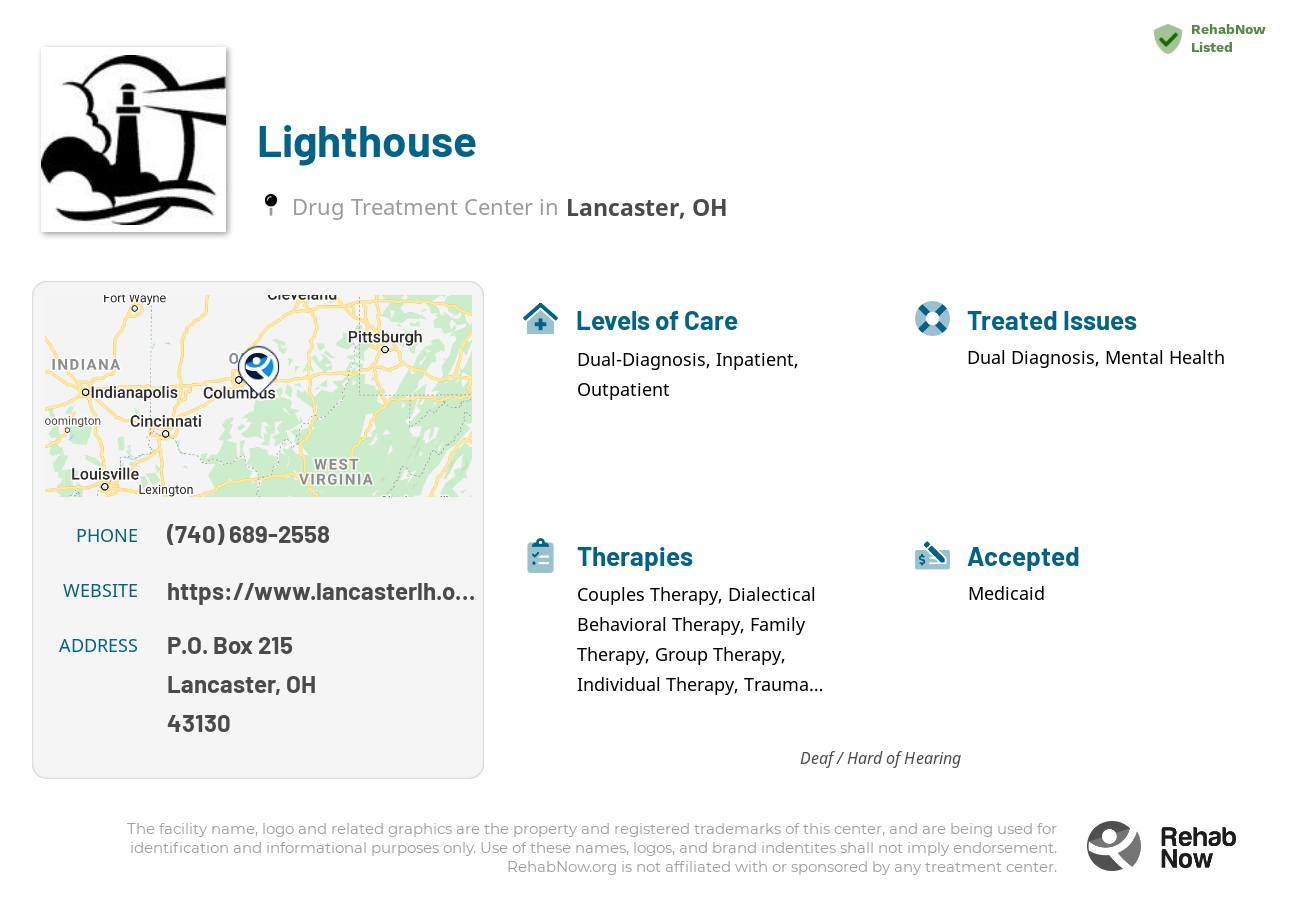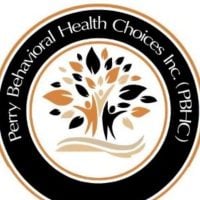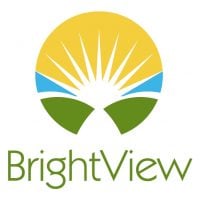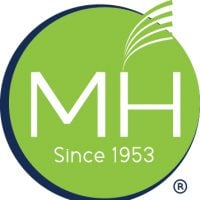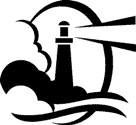
Lighthouse
Drug Rehab Center in Lancaster, Ohio
- Mental Health
- Dual Diagnosis
Lighthouse is a mental health treatment facility in Lancaster, Ohio providing inpatient and outpatient care with a focus on evidence-based therapies, cognitive behavioral therapy, and dual-diagnosis care to help clients develop skills to overcome their challenges.
About Lighthouse in Ohio
Lighthouse in Lancaster, Ohio is a premier addiction treatment facility offering dual-diagnosis, inpatient, and outpatient levels of care tailored to meet the individual needs of each of their clients. They specialize in treating individuals suffering from a dual diagnosis, which is a combination of a mental health disorder and substance use disorder. Their highly trained team of professionals seek to provide comprehensive and compassionate care in order to help individuals struggling to overcome their addiction.
At Lighthouse in Lancaster, Ohio, their team of highly experienced and knowledgeable clinicians provide an array of evidence-based practices which include individual and group therapy, medication management, discharge planning, relapse prevention, psycho-education, and aftercare services. Their clients also have access to a wide variety of additional services and activities such as art and music therapy, yoga, and exercise. Lighthouse is a licensed substance use disorder treatment facility and holds accreditation from the Joint Commission on Accreditation of Health Organizations. They also accept most forms of private health insurance.
Genders
Ages
Modality
Additional
Conditions and Issues Treated
Levels of Care Offered
This center offers a variety of custom treatment tailored to individual recovery. Currently available are Dual-Diagnosis, Inpatient, Outpatient, with additional therapies available as listed below.
Inpatient treatment for alcoholism or drug addiction is an option that provides the addict with a supportive environment in which they can stop using. This type of treatment is appropriate for addicts that are most in need of intensive care and supervision. This includes those who were unable to quit on their own, those who need more structure than they can get in outpatient treatment.
“Outpatient treatment is ideal for those who have a lower intensity addiction. It’s also suitable for those with a supportive environment and those on a tight budget.
Outpatient treatment can be considered the lowest intensity level of addiction treatment. It is ideal for early phase addiction or lower intensity addictions. It may involve weekly sessions instead of daily. Peer group support, 12-step programs, and individual counseling may still be used and anti-addiction medication.
Therapies & Programs
No single treatment works for all addicts; therefore, the goal of treatment and therapy should be to find what works best for each individual. Some people requiring addiction treatment may only need a few weeks of inpatient care. Others will require long-term residential care. Tolerance and withdrawal levels vary from person to person and thus affect the intensity of the treatment needed.
If an individualized approach to treatment and therapy is not offered, addicts may fail to reap benefits from their efforts. Professionals must customize plans according to their patient’s needs, limitations, and strengths. The goal of all forms of addiction treatment should be for addicts to find healthy ways to cope with their addiction and its underlying causes.
Couples therapy for drug addiction is a unique form of therapy that allows family members to work through the emotional issues of their loved one’s addiction together. Family members can support each other while learning how to cope with the addiction and encourage healthy changes.
Accordingly, couples therapy for drug addiction is designed for an addict and their significant other or spouse. The two will work with a therapist to learn how the addiction affects themselves and the relationship and how to break the negative patterns of behavior that may have developed.
Drug addiction can destroy a person’s life, as well as their family and friends. The loss of one’s ability to choose how to live and behave often leads the addict into depression, anger, guilt, and many emotional problems.
The therapies usually include siblings, children, and parents who are involved in their daily lives. These sessions are vital because they address past issues that may have hampered an addict’s or alcoholic’s recovery and provide support at a crucial time!
One of the most critical aspects of family therapy is helping addicts’ loved ones see their situation in a new light. It’s also one of the most challenging things a family can do when a loved one struggles with addiction or alcoholism.
Group therapy is held in a safe, controlled setting where patients can feel comfortable sharing their struggles and gaining perspective through shared conversations. It takes place in a group rather than one on one to prevent feelings of isolation or being unique in their situation while creating an environment for addicts at Lighthouse to develop fellowship, accountability, and support. Group therapy is an important tool in recovery that prevents cravings that prompt a return to active addiction.
This type of therapy involves the use of a variety of therapeutic techniques to help addicts recover from past traumas that might have triggered their substance abuse. During these sessions, therapists will work with the addict to address painful memories and learn how to cope effectively with stressors as they arise.
During these types of sessions, therapists will typically focus on three main goals:
- Identifying and expressing painful emotions associated with past traumas.
- Reducing the effects of stress on an addict’s life by developing more effective coping mechanisms.
- Developing healthy ways of thinking about stressful situations that can help addicts avoid substance abuse issues in the future.
This type of therapy is typically used in conjunction with other types of addiction treatment services. By identifying and dealing with the root cause of addiction, most addicts can overcome their cravings and prevent relapse once they leave rehab.
Many different types of addiction treatment services exist to help addicts safely get sober, but it’s important for recovering individuals to find a therapist or support group that will help them address the root cause of their addiction.
Dialectical Behavior Therapy is a form of Cognitive Behavioral Therapy that helps patients understand the relationship between their thoughts, feelings, and behaviors. It is beneficial for those whose addictions and behaviors stem from severe mental health issues. It aims to help the patient achieve their goals and identify how they can enhance their lives.
Cognitive-behavioral therapy is a talking-based method that helps people struggling with addiction replace destructive behaviors with healthier ones. CBT also helps them identify the underlying thoughts and beliefs that cause these behaviors in the first place and ways to control those thoughts and feelings. It can be administered as a holistic therapy or as part of combination therapy and—as opposed to turning to drugs and alcohol—helps addicts learn how to respond to negative thoughts instead.
Payment Options Accepted
For specific insurance or payment methods please contact us.
Additional Details
Specifics, location, and helpful extra information.
Lancaster, Ohio 43130 Phone Number(740) 689-2558 Meta DetailsUpdated November 25, 2023
Staff Verified
Lighthouse Patient Reviews
There are no reviews yet. Be the first one to write one.
Lancaster, Ohio Addiction Information
Ohio is suffering from a drug abuse problem that is costing thousands of its residents their lives every single year. Opioids, particularly Fentanyl and heroin, are the leading drugs in the state. The state ranks in the top 10 for illicit use of painkillers. Opioid-related overdose rates in Ohio are by far some of the highest in the country.
The drug addiction problem in Lancaster, Ohio, is relatively bad. Over 1,000 hospitalizations were due to drug overdoses in 2016. This number is only increasing, and drug addiction is becoming a serious problem. Of all drug overdose deaths in Ohio in 2015, 63% were due to opioids. There are many resources available to help you get sober, and the sooner you seek help, the better your chances of recovery will be.
Treatment in Nearby Cities
- Batavia, OH (95.1 mi.)
- Barberton, OH (104.0 mi.)
- Newton Falls, OH (133.0 mi.)
- Bellevue, OH (108.7 mi.)
- Dennison, OH (82.4 mi.)
Centers near Lighthouse



The facility name, logo and brand are the property and registered trademarks of Lighthouse, and are being used for identification and informational purposes only. Use of these names, logos and brands shall not imply endorsement. RehabNow.org is not affiliated with or sponsored by Lighthouse.

